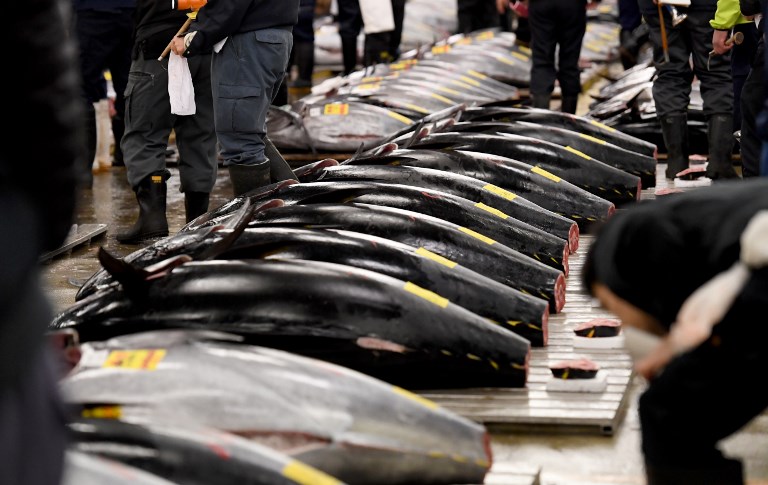Bigger market eyed for fully farmed tuna in Japan

Fishmongers check bluefin tuna prior to the new year’s first auction at the Tsukiji fish market in Tokyo on January 5, 2017.
AFP FILE PHOTO
Two major fisheries product companies are scheduled to ship out the bluefin tuna fish possibly as soon as November and have also considered exporting the fish.
Such business plans are also expected to be a last-resort measure for protecting bluefin tuna, whose population has plunged due to overfishing.
Kyokuyo Co., one of the two companies, will begin in November selling bluefin tuna to restaurant chains and also to shops specializing in fresh fish in department stores across the nation. The bluefin tuna is completely farm-raised in waters southwest of the Shikoku region.
The company also aims to export bluefin tuna abroad in the future. A Kyokuyo spokesperson said: “The flesh [of completely farm-raised tuna] is a deep, bright shade of red. The quality compares favorably with that of wild fish.”
Nippon Suisan Kaisha, Ltd., the other major company, also aims to begin shipment of the tuna for the first time this winter.
Article continues after this advertisementThe company has set a goal of shipping 500 tons in fiscal 2018 and 1,000 tons in fiscal 2019.
Article continues after this advertisementJapan’s domestic supply volume of bluefin tuna was about 46,000 tons in 2015. Most of the tuna was imported or farm-raised. The volume of wild bluefin tuna caught by domestic fishermen was about 8,000 tons.
Maruha Nichiro Corp. already began shipments of completely farm-raised tuna in 2015. As Kyokuyo and Nippon Suisan follow suit, shipment of such bluefin tuna will become more common.
Completely farm-raised tuna will likely become a fixture in the market.
Bluefin tuna are highly popular for use in high-grade sushi. It is thought that Japan consumes about 80 percent of all bluefin tuna caught in the world.
As Japanese cuisine booms overseas, demand for the fish has risen in emerging countries in Asia and elsewhere.
The volume of bluefin tuna in the Pacific Ocean has fallen to about 10 percent of peak year volumes due to overfishing.
All countries are subject to annual catch limits, which has led to growing interest in completely farm-raised bluefin tuna.
A senior official of the Fisheries Agency said, “The spread of completely farm-raised bluefin tuna can be a powerful tool for protecting natural resources.”
However, cost reduction remains a hurdle for expansion of the cultivation technique as it takes about three years from hatching to shipment.
Moreover, only a few percent of hatched fish mature to the extent necessary for shipment.
The development of technology that boosts survival rates, and other factors, will be keys to the industry’s success.
Prof. Isao Sakaguchi of Gakushuin University, an expert on tuna resource controls, highlighted goals for enabling the mass-production of completely farm-raised bluefin tuna.
“The sustainability of feed used in tuna farming, such as mackerel and horse mackerel, must be considered. It’s also important to develop feeds made from plants,” he said.
■ Completely farm-raised bluefin tuna
A method for cultivating fish hatched from the eggs of fish that have also been farm-raised. In 2002, Kindai University became the first entity in the world to succeed in completely farm-raising bluefin tuna. In the initial stage of farming, eggs taken from wild fish are artificially hatched and cultivated. These fish later lay eggs which are similarly cultivated. Repeating this cycle eliminates reliance on eggs or young fish from the wild, which limits negative impacts on natural resources. To distinguish from conventional farming methods in which young fish are caught and then farmed to maturity, this method is called “complete” farm-raising.